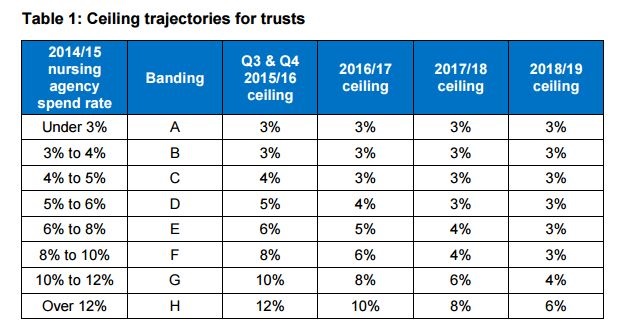01.09.15
Individual agency spend ceilings set for trusts
An annual ceiling for total agency spend for each trust between 2015-16 and 2018-19 is being introduced under new rules published by Monitor and the NHS Trust Development Authority (NHS TDA).
Trusts are being sent individual ceilings today (1 September) and will have the opportunity to apply for exceptions if there are specific local needs.
Also, there will be a mandatory use of frameworks for procuring agency staff and limits will be put on the amount individual agency staff can be paid per shift – this will be implemented later in the year after further work by the regulators.
Once a trust has received its annual ceilings information it should provide a monthly profile of the planned nursing agency spend that enables it to achieve its ceiling for October 2015 to March 2016. A template will be provided and should be completed and submitted to Monitor/TDA by 14 September 2015.
The ceilings set depend on trusts’ 2014-15 nursing agency spend percentage of their total nursing staff spend – this is defined as all registered nursing, midwifery and health visiting staff, but excluding healthcare assistants and other support staff registered nurses. The profile for trusts’ ceilings is described in Table 1:

Earlier this year, it was revealed the collective amount of money spent on agency staffing has increased to around £3.3bn per year.
An NHE investigation also found that nearly a fifth of NHS trusts have spent more than a tenth of their total staff budget on agency and two-thirds of trusts spent at least double their agency forecast.
Ruth May, Nursing Director of Monitor, said: “Trusts are working hard to reduce the amount of agency staff they use, and this is something we’re actively supporting through initiatives like our agency support team.”
“We’ve worked hard with the NHS to develop this set of rules which will support Boards and in particular Chief Nurses to reinvest the money currently spent on agency staff into providing the best care for patients. Today’s guidance is another step in delivering a safe and secure NHS that will meet the needs of patients long into the future.”
It was noted that a trust’s performance against its annual ceilings will be monitored on its monthly returns and trusts will be held to account on a quarterly basis.
The rules add: “It is expected trusts will take the necessary steps to procure all of their nursing agency staff through approved frameworks. However in some instances, trusts may have existing arrangements with an agency supplier in place where they receive superior quality and better value for money than is available on approved framework agreements.
“For trusts to use this arrangement without having to report an override of the controls to Monitor/TDA on a shift by shift basis, trusts will be required to seek prior approval from Monitor/TDA to use that agency. Trusts will need to apply for approval by 1 October 2015.”
But where trusts are not compliant, they will be required to submit shift-level detail and explanations for the reason behind this.
Also, the rules “will not be adjusted to accommodate inadequate staff rostering or poor planning of overall workforce requirements”.
If a trust consistently urgently overrides the rules they may be investigated by Monitor and TDA, which are to be merged as NHS Improvement.
Responding to the news, Chris Hopson, chief executive at NHS Providers, said: “Our members recognise the need for the provider sector to return to financial balance as quickly as possible, and that an important part of this task involves reducing the rapid growth in agency staffing spend.
“As Monitor and the TDA have stated in their publication, we recognise that there are ‘complex workforce challenges facing the healthcare sector’. Any action on agency spend can only be one aspect of the wider work that is needed to achieve more effective staffing, including, crucially, addressing the underlying workforce shortages across the service.
“Therefore, we are hopeful that the new rules announced today will be implemented in a spirit of partnership, and with an appreciation that NHS providers must be empowered by the national bodies to deliver, rather than be told what to do.”
He added that it will be important that Monitor and the TDA are “supportive” of providers that are having to make difficult decisions where there is a conflict between meeting national requirements on staffing levels, and complying with the new rules.
“We recognise from the publication that setting the amount that individual agency staff can be paid per shift is complex, and must take account of regional factors, however, price caps would make a key contribution to reducing agency spend,” said Hopson.